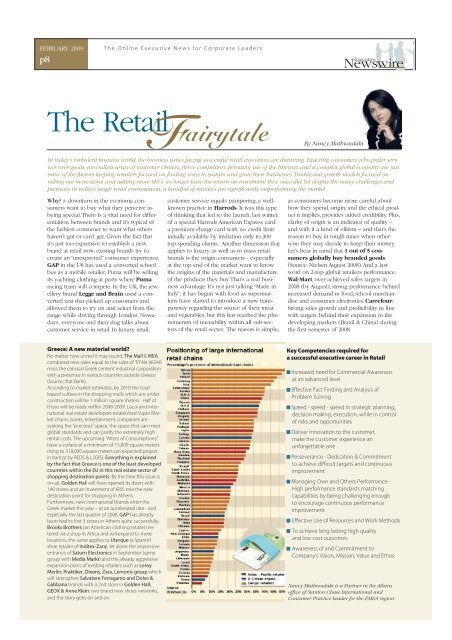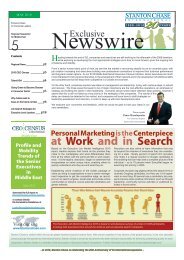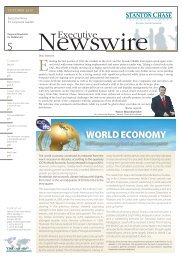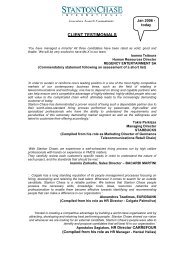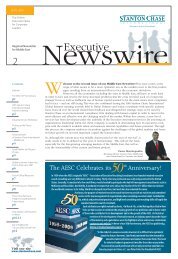The Financial Crisis - Stanton Chase International
The Financial Crisis - Stanton Chase International
The Financial Crisis - Stanton Chase International
Create successful ePaper yourself
Turn your PDF publications into a flip-book with our unique Google optimized e-Paper software.
FEBRUARY 2009 T h e O n l i n e E x e c u t i v e N e w s f o r C o r p o r a t e L e a d e r s<br />
p8<br />
<strong>The</strong> Retail Fairytale Why? a downturn in the economy, consumers<br />
want to buy what they perceive as<br />
being special. <strong>The</strong>re is a vital need for differentiation<br />
between brands and it’s typical of<br />
the fashion consumer to want what others<br />
haven’t got or can’t get. Given the fact that<br />
it’s just too expensive to establish a new<br />
brand at retail now, existing brands try to<br />
create an “unexpected” consumer experience.<br />
GAP in the US has used a converted school<br />
bus as a mobile retailer; Puma will be selling<br />
its yachting clothing at ports where Puma<br />
racing team will compete. In the UK, the jewellery<br />
brand Legge and Brain used a converted<br />
taxi that picked up customers and<br />
allowed them to try on and select from the<br />
range while driving through London. Nowadays,<br />
everyone and their dog talks about<br />
customer service in retail. In luxury retail,<br />
customer service equals pampering, a wellknown<br />
practice in Harrods. It was this type<br />
of thinking that led to the launch, last winter,<br />
of a special Harrods American Express card:<br />
a premium charge card with no credit limit<br />
initially available by invitation only to 300<br />
top-spending clients. Another dimension that<br />
applies to luxury as well as to mass retail<br />
brands is the origin: consumers - especially<br />
at the top end of the market want to know<br />
the origins of the materials and manufacture<br />
of the products they buy. That’s a real business<br />
advantage. It’s not just talking “Made in<br />
Italy”; it has begun with food as supermarkets<br />
have started to introduce a new transparency<br />
regarding the source of their meat<br />
and vegetables, but this has reached the phenomenon<br />
of traceability within all sub-sectors<br />
of the retail sector. <strong>The</strong> reason is simple;<br />
By Nancy Mathioudaki<br />
Executive<br />
Newswire<br />
In today’s turbulent business world, the business issues facing successful retail executives are daunting. Exacting consumers who prefer services<br />
over goods, an endless array of customer choices, fierce competitors, pervasive use of the Internet, and a complex global economy are just<br />
some of the factors keeping retailers focused on finding ways to sustain and grow their businesses. Traditional growth models focused on<br />
rolling out more stores and adding more SKUs no longer have the return on investment they once did. Yet despite the many challenges and<br />
pressures in today’s tough retail environment, a handful of retailers are significantly outperforming the market.<br />
Greece: A new material world?<br />
No matter how unreal it may sound, <strong>The</strong> Mall & IKEA<br />
combined new sales equal to the sales of TITAN (q540<br />
mio), the colossal Greek cement industrial corporation<br />
with a presence in various countries outside Greece<br />
(source: Stat Bank).<br />
According to market estimates, by 2010 the total<br />
leased surface in the shopping malls which are under<br />
construction will be 1 million square meters. Half of<br />
those will be ready within 2008-2009. Local and international<br />
real estate developers established Super Market<br />
chains, banks, entertainment companies are<br />
seeking the “precious” space, the space that can meet<br />
global standards and can justify the extremely high<br />
rental costs. <strong>The</strong> upcoming “Alters of Consumptions”<br />
have a surface of a minimum of 15,000 square meters<br />
rising to 318,000 square meters (an expected project<br />
in Kantza by REDS & LSGIE). Everything is explained<br />
by the fact that Greece is one of the least developed<br />
countries within the EU in this real estate sector of<br />
shopping destination points. By the time this issue is<br />
on-air, Golden Hall will have opened its doors with<br />
140 stores and an investment of q65 mio the new<br />
destination point for shopping in Athens.<br />
Furthermore, new international brands enter the<br />
Greek market this year – at an accelerated rate - and<br />
especially the last quarter of 2008. GAP has already<br />
launched its first 3 stores in Athens quite successfully,<br />
Brooks Brothers (an American clothing retailer) entered<br />
via a shop in Attica and will expand to more<br />
locations, the same applies to Uterque (a Spanish<br />
shoe retailer of Inditex-Zara), let alone the impressive<br />
entrance of Saturn Electronics in September (same<br />
group with Media Markt) and the already aggressive<br />
expansion plans of existing retailers such as Leroy<br />
Merlin, Praktiker, Dixons, Zara, Lemonis group which<br />
will strengthen Salvatore Ferragamo and Dolce &<br />
Gabbana brands with a 2nd store in Golden Hall;<br />
GEOX & Anne Klein: two brand new shoes networks,<br />
and the story goes on and on.<br />
as consumers become more careful about<br />
how they spend, origin, and the ethical product<br />
it implies, provides added credibility. Plus,<br />
clarity of origin is an indicator of quality –<br />
and with it a kind of elitism – and that’s the<br />
reason to buy in tough times when otherwise<br />
they may decide to keep their money.<br />
Let’s bear in mind that 1 out of 5 consumers<br />
globally buy branded goods<br />
(Source: Nielsen August 2008). And a last<br />
word on 2-top global retailers performance:<br />
Wal-Mart, over achieved sales targets in<br />
2008 (by August); strong performance behind<br />
increased demand in food, school merchandise<br />
and consumer electronics. Carrefour:<br />
Strong sales growth and profitability in line<br />
with targets, behind their expansion in the<br />
developing markets (Brazil & China) during<br />
the first semester of 2008.<br />
Key Competencies required for<br />
a successful executive career in Retail<br />
Increased need for Commercial Awareness<br />
at an advanced level<br />
Effective Fact Finding and Analysis of<br />
Problem Solving<br />
Speed - speed - speed in strategic planning,<br />
decision making, execution, while in control<br />
of risks and opportunities<br />
Deliver Innovation to the customer,<br />
make the customer experience an<br />
unforgettable one<br />
Perseverance - Dedication & Commitment<br />
to achieve difficult targets and continuous<br />
improvement<br />
Managing Own and Others Performance -<br />
High performance standards matching<br />
capabilities by being challenging enough<br />
to encourage continuous performance<br />
improvement<br />
Effective Use of Resources and Work Methods<br />
To achieve long lasting high quality<br />
and low cost outcomes<br />
Awareness of and Commitment to<br />
Company’s Vision, Mission, Value and Ethos<br />
Nancy Mathioudaki is a Partner in the Athens<br />
office of <strong>Stanton</strong> <strong>Chase</strong> <strong>International</strong> and<br />
Consumer Practice Leader for the EMEA region.


